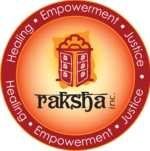
6 months in!
January 9, 2025
Raksha’s Reproductive Justice Cohort began with two college focus groups, conducted at Emory and Georgia Tech, where Raksha staff had a chance to speak with young South Asian students passionate about making a difference in the movement against violence.
We recognized the need to build these students up as agents of change in their communities. We also recognized the lonely and often painful silos they were in, working against systemic oppressions with no more but a handful of other passionate students.
Thus, we created the container of our Reproductive Justice (RJ) cohort, working with 10 South Asian young people (20-26) interested in moving together towards an end to violence. We have been meeting every month since August 2024, and will end our time together in May 2025.
RJ Ancestors
The goal of the cohort is to build up South Asian young people by connecting them to each other, to resources, frameworks, and knowledge systems. During our first three sessions, we have focused on introducing the reproductive justice framework, understanding the landscape of the anti-violence movement, and gaining skills for crisis intervention. Part of that work was asking our cohort members to uplift an “ancestor” in their reproductive justice journey. Two of our cohort members graciously agreed to have their work shared.
“My introduction to reproductive justice began on Tumblr as a teenager, where I first learned about Kimberlé Crenshaw’s work on intersectionality, which shaped my understanding of overlapping systems of oppression. Later, through my Health Disparities minor at UF, I connected these concepts to the impacts of social inequities on marginalized communities. While I deeply admire Crenshaw’s contributions, her silence on the current genocide in Palestine makes me critical of her now. It’s a reminder that even the leaders we look up to can fall short in moments that demand speaking up and action.” –Cohort member Nuzhat

Other members shared stories of close personal friends, photos of their childhood, and words and pictures of activists and writers like Angela Davis, June Jordan and bell hooks. One slide quotes Audre Lorde writing, “I feel, therefore I can be free. Poetry coins the language to express and charter this revolutionary demand, the implementation of that freedom.”
It is important to note the proliferation of tribute to Black women writers, activists, and thinkers, especially since the RJ framework comes from the work of Women of African Descent for Reproductive Justice (1994).

As we wrapped up 2024, the RJ cohort moved into critiquing the framework of “survivorship”, studying community grieving specific to victims of IPV, and welcomed self-care and sex ed. Thank you to Yasmine Ramachandra, Ben Haseen, and Jahnavi Dubhashi for sharing their expertise with our cohort members!
We hope to share more of the amazing work members create as they plan towards their impact projects in Spring 2025. These projects will inspire community movement towards the principles of reproductive justice. We can’t wait to share them with you!
Keep up with our work by following up on IG, FB, and LinkedIn. If you are interested in the next iteration of this cohort, interested in sharing your skills with us, or being a speaker at one of our sessions, please email outreach@raksha.org.
Disclaimers: This product was funded by Grant Number 90EV0054-01-00 from the Department of Health and Human services (DHHS); Administration for Children and Families (ACF); Administration on Children, Youth and Families (ACYF); Family Youth Services Bureau (FYSB); Family Violence Division. The viewpoints contained in this guide are solely the responsibility of the authors and do not necessarily represent the official views or policies of the Administration for Children and Families. While we strive to provide the most current information, we cannot bear responsibility for maintaining status on updates or time relevance of the source materials, information or links to the official resources we source from-Raksha,Inc.
